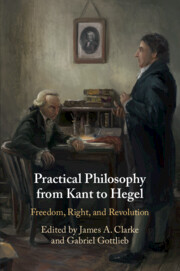Book contents
- Practical Philosophy from Kant to Hegel
- Practical Philosophy from Kant to Hegel
- Copyright page
- Contents
- Contributors
- Acknowledgments
- Abbreviations
- Introduction
- 1 The Original Empty Formalism Objection
- 2 Freedom and Ethical Necessity
- 3 Maimonides and Kant in the Ethical Thought of Salomon Maimon
- 4 Erhard on Right and Morality
- 5 Erhard on Revolutionary Action
- 6 Elise Reimarus on Freedom and Rebellion
- 7 Freedom and Duty
- 8 Fichte’s Ethical Holism
- 9 Jacobi on Revolution and Practical Nihilism
- 10 The Political Implications of Friedrich Schlegel’s Poetic, Republican Discourse
- 11 The Limits of State Action
- 12 Echoes of Revolution
- 13 Public Opinion and Ideology in Hegel’s Philosophy of Right
- Bibliography
- Index
3 - Maimonides and Kant in the Ethical Thought of Salomon Maimon
Published online by Cambridge University Press: 16 March 2021
- Practical Philosophy from Kant to Hegel
- Practical Philosophy from Kant to Hegel
- Copyright page
- Contents
- Contributors
- Acknowledgments
- Abbreviations
- Introduction
- 1 The Original Empty Formalism Objection
- 2 Freedom and Ethical Necessity
- 3 Maimonides and Kant in the Ethical Thought of Salomon Maimon
- 4 Erhard on Right and Morality
- 5 Erhard on Revolutionary Action
- 6 Elise Reimarus on Freedom and Rebellion
- 7 Freedom and Duty
- 8 Fichte’s Ethical Holism
- 9 Jacobi on Revolution and Practical Nihilism
- 10 The Political Implications of Friedrich Schlegel’s Poetic, Republican Discourse
- 11 The Limits of State Action
- 12 Echoes of Revolution
- 13 Public Opinion and Ideology in Hegel’s Philosophy of Right
- Bibliography
- Index
Summary
A cursory account of Maimon’s philosophical development, gleaned from his Autobiography, suggests a gradual emancipation from early Jewish influences toward a life-changing encounter with the thought of Immanuel Kant.However true in outline, this account does a disservice to the lasting influence of Maimonides upon all precincts of Maimon’s thought, and especially on his practical philosophy.In Maimon’s moral writings of the 1790’s, one finds a Maimonidean-inspired rationalism leading him to reject the Kantian “primacy of the practical” in favor of the superiority of intellectual perfection to moral perfection, a conclusion also in keeping with Spinoza, another important influence upon Maimon’s intellectual development. This rejection, in turn, leads Maimon to amend the theoretical foundations of Kantian practical philosophy by reconsidering the foundations of that philosophy; in Maimon’s words, “to show, in some deviation from Kant, that the morally good is good only because it is true.”Thus, while there is no doubt about Kant’s profound affect upon Maimon’s philosophical development, one cannot understand Maimon’s departures from Kant apart from the influence of Maimonides, which comes to light with special clarity in Maimon’s moral writings.
- Type
- Chapter
- Information
- Practical Philosophy from Kant to HegelFreedom, Right, and Revolution, pp. 45 - 60Publisher: Cambridge University PressPrint publication year: 2021

